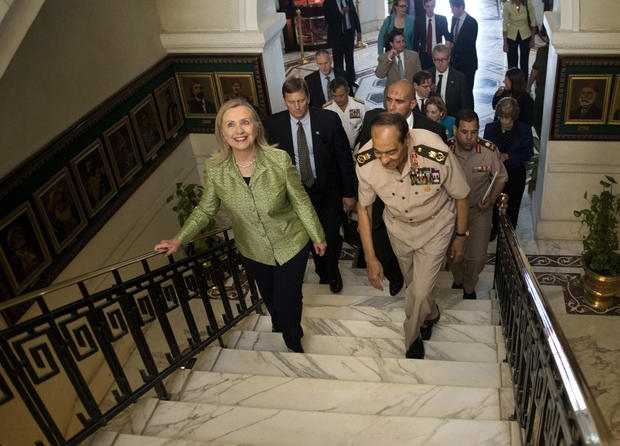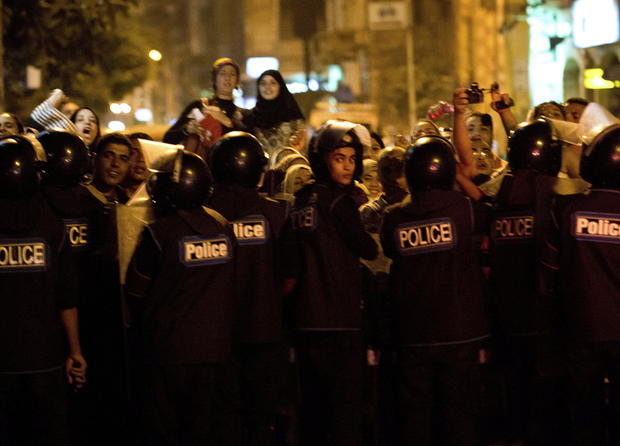Hillary Clinton's "special welcome" in Egypt
(CBS News) CAIRO - Secretary of State Hillary Clinton was given a hostile reception in Alexandria last night after she presided over the reopening of the American Consulate in Egypt's second-largest city. Following the flag-raising ceremony, angry protesters pelted her motorcade (but not her car) with food, water bottles and shoes.
It was an awkward end to a delicate trip of diplomacy intended to trumpet continued U.S. support for the political transition in Egypt, while hoping to dispel the notion held by some Egyptians that Washington is "putting its finger on the scale" with regards to domestic politics of the Arab World's most populous country.
Clinton met yesterday with the head of Egypt's top military council, Field Marshall Hussein Tantawi, during the second day of her trip to the Egyptian capital. Tantawi had served as the interim leader of Egypt after the popular uprising that forced long-time President Hosni Mubarak to step down last year.
The Field Marshall gave Clinton a warm reception on Sunday, meeting her on the steps of the Ministry of Defense. They shook hands and then walked inside for a meeting that lasted a little over an hour. A select group of U.S. officials sat in the room during the conversation, including Ambassador Anne Paterson.
The Field Marshall started the meeting by inquiring about the "special welcome" that the Secretary received, a joking reference to the protesters who gathered outside of the Secretary's hotel on Saturday night - and perhaps, unintentionally, foreshadowing the angry crowd that would later greet her in Alexandria.
Outside Clinton's Cairo hotel, a group of protesters carried signs that blamed the U.S. for supporting the Muslim Brotherhood. One sign raised read: "Obama doesn't negotiate with terrorists, he supports them."
The protests followed a meeting on Saturday between Egypt's newly-elected President Mohammed Morsi and Secretary Clinton. She is the highest-ranking U.S. official to meet with the Islamist president since his election four weeks ago.
Clinton said that she told both President Morsi and Field Marshall Tantawi that the U.S. supports a full transition to democracy, with the military returning to a national security role.
"Egyptians have sacrificed so much to get to this moment, and we think a strong, durable democracy that respects the rule of law, that protects the right of all is the best way forward for Egyptians to realize your aspirations and to meet your own goals for development," Clinton said.
Egypt's military raises stakes against Islamists
Clinton to Egypt's Morsi: Find way out of crisis
U.S. role in post-Mubarak Egypt still unclear
The conversation did require diplomacy. The military and the newly-elected president are locked in a standoff over a host of contentious political issues: the democratically-elected parliament (which the military dissolved by court order); the still-absent constitution and the makeup of the constituent assembly; and the continued dominance of the military on the political scene.
While in Cairo, Clinton also met with a delegation of Christian figures from multiple denominations. The Secretary told them that the United States supports a full transition to democratic rule and that she wanted to dispel, in clear terms, the notion of U.S. interference and make clear that only Egyptians can select their leaders.
She also encouraged them to participate fully in the political life of their country if they want to protect the rights.

